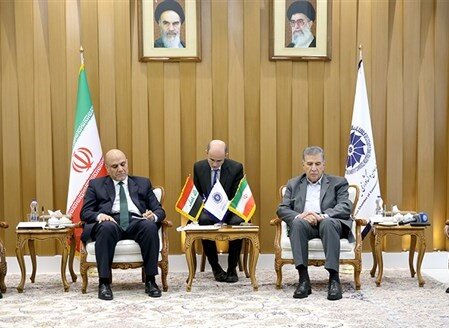Iran launches trade policy council for Iraq as private sector eyes major investments

TEHRAN – Iran's private sector is ready to boost its investment presence in Iraq, senior officials from the Iran Chamber of Commerce, Industries, Mines and Agriculture (ICCIMA) said during a joint meeting with Iraq’s ambassador to Tehran.
The meeting marked the formal launch of the Iran-Iraq Trade Policy Council at the ICCIMA, aimed at expanding bilateral trade and reducing the trade imbalance between the two countries by up to 50 percent.
Samad Hassanzadeh, head of ICCIMA, said the new council would help increase imports of goods and raw materials from Iraq, while facilitating joint investment and production ventures between private entities in both countries.
He noted that a recent investment forum introduced 140 opportunities in Iraq and expressed hope that detailed data on those projects would be shared with ICCIMA to enable more effective participation by Iranian investors.
Hassanzadeh emphasized the importance of holding workshops on Iraq’s investment incentives and simplifying the issuance of bank guarantees, which he said were key concerns for Iranian investors. Ownership rights and the future security of investments in Iraq also require clarification, he added.
In this meeting, ICCIMA Deputy Head Hossein Pirmoazzen said that Iraq remains one of Iran's top economic partners, with bilateral trade currently valued at $12.7 billion. But he noted the potential for even greater economic cooperation, citing plans to increase Iran’s ranking from the fourth to the second-largest exporter to Iraq.
To support this, the council includes representatives from major provinces and border regions active in Iran-Iraq trade. Pirmoazzen urged improvements in transport infrastructure and customs processing, including the deployment of X-ray systems at border crossings, to ease trade bottlenecks that have cut freight movement by nearly 50 percent.
He also revealed that the council plans to allocate 10 percent of Iran's total imports to come through Basra and neighboring Iraqi provinces.
Yahya Al-e Es’haq, head of the Iran-Iraq Joint Chamber of Commerce, said the most urgent issue remains banking and financial transactions. Without solving the money transfer and guarantee bottlenecks, long-term investment will remain limited.
He added that Iraq can help offset the trade imbalance by facilitating the transit of up to $5 billion worth of goods that meet Iranian market demands.
Nasir Abdul Mohsen Abdullah, Iraq’s ambassador to Iran, said Baghdad is keen to attract Iranian investors, noting that Iranian companies are capable of executing major projects. He detailed investment opportunities across 14 provinces, including:
Over 27 projects in energy and renewables, two in oil and gas, 22 in heavy and medium industries, nine in industrial zones and free trade areas, 10 in agriculture, 10 in healthcare and 25 projects in housing.
He estimated the total investment potential at $70 billion, adding that stronger economic ties and joint ventures would help balance trade between the two neighbors.
EF/MA
Photo: ICCIMA Head Samad Hassanzadeh (R) and Iraq’s ambassador to Tehran Nasir Abdul Mohsen Abdullah meet in Tehran on Sunday.
Leave a Comment